|
As you are by now very well aware, thanks to an endless number of
tributes and reissues, 2002 marks the centennial of Richard Rodgers'
birth. While the number of honorariums and CDs are quickly making it feel
like 100 years has passed since the beginning of this great event, quite a
number of albums are being released that deserve one's attention.
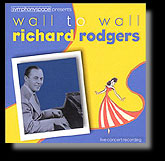 On March 23, a 12 hour event at Symphony Space in New York City
practically kicked off the Rodgers Marathon with a 12 hour event entitled
Wall To Wall Richard Rodgers. This free concert featured performances from the expected cabaret and
Broadway stars, as well as some unexpected surprises, such as a veteran of
the Yiddish theater singing "The Surrey With The Fringe On Top" and
"You'll Never Walk Alone" in Yiddish. As the latter is definitely something I would pay to
hear, the fact that the Fynsworth Alley recording of the event focuses
solely on the traditional offerings is a major disappointment, especially
since the CD provides a paltry fifty-four minute representation of the
twelve-hour marathon. On March 23, a 12 hour event at Symphony Space in New York City
practically kicked off the Rodgers Marathon with a 12 hour event entitled
Wall To Wall Richard Rodgers. This free concert featured performances from the expected cabaret and
Broadway stars, as well as some unexpected surprises, such as a veteran of
the Yiddish theater singing "The Surrey With The Fringe On Top" and
"You'll Never Walk Alone" in Yiddish. As the latter is definitely something I would pay to
hear, the fact that the Fynsworth Alley recording of the event focuses
solely on the traditional offerings is a major disappointment, especially
since the CD provides a paltry fifty-four minute representation of the
twelve-hour marathon.
That said, there is not a weak performance on the album. While most of
the tracks feature the usual Rodgers suspects (KT Sullivan's "Ten Cents A
Dance," Mary Cleere Haran's "Manhattan," and Billy Stritch's "Mountain
Greenery," for example) there are a few slightly unexpected and delightful
tracks. Judy Kaye wrings a great sense of pathos out of Rodgers and Hart's
"Little Girl Blue." Maureen McGovern's creamy vocals perfectly interpret
"It Never Entered My Mind," and fuse the chestnuts "Climb Ev'ry Mountain"
and "You'll Never Walk Alone" into a touching medley. Other highlights
include James Naughton's "You Are Too Beautiful," from Rodgers and Hart's
little known Hallelujah, I'm a Bum, Debbie Gravitte's powerhouse
"Johnny One Note," and Richard White's touching "Where Or When."
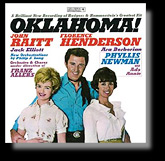 1943 saw the end of one era in musical theater and the beginning of the
next through the transition of Rodgers from Hart to Hammerstein and the
opening of the then groundbreaking musical, Oklahoma! While many
a recording of this classic work exist, Sony has released one well worth
adding to one's library: the 1964 studio recording that featured legendary
leading man John Raitt as Curly, Florence Henderson as Laurey, and
Phyllis Newman as Ado Annie. 1943 saw the end of one era in musical theater and the beginning of the
next through the transition of Rodgers from Hart to Hammerstein and the
opening of the then groundbreaking musical, Oklahoma! While many
a recording of this classic work exist, Sony has released one well worth
adding to one's library: the 1964 studio recording that featured legendary
leading man John Raitt as Curly, Florence Henderson as Laurey, and
Phyllis Newman as Ado Annie.
Both Raitt and Henderson have a long-standing relationship with the
material as he played Curly during the ten months the national company
resided in Chicago and she played Laurey on tour when she was 18. The two
are in top voice on the recording and bring a freshness and emotional
honesty to the album that is highly enjoyable (and this is coming from
somebody who has never warmed to the material). Phyllis Newman is equally
enjoyable in her role, especially in her big number, "I Cain't Say No."
'New' orchestrations by Philip J. Lang give the album a rich, almost
cinematic scope. Unlike the rest of the Columbia/Sony reissues, this CD
contains no additional extras. But, like the rest of the reissues, the
album sparkles and sounds incredible.
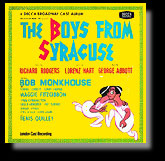 In addition to Oklahoma!, Broadway is currently home to another
Rodgers' revival: The Boys From Syracuse. Based on Shakespeare's
Comedy of Errors (which in turn was based on a Roman comedy by
Plautus), Syracuse is a slapstick comedy illustrating the farcical
troubles of two sets of long-separated twins engaged in an ever escalating
case of mistaken identity. Decca Records has released the 1963 London
production's cast album, which starred Bob Monkhouse and Denis Quilley as
the Antipholuses (Antipholi?) and Ronnie Corbett and Sonny Farrar as the
Dromios of Syracuse and Ephesus, respectively, and Lynn Kennington as
Adriana and Paula Hendrix and Luciana. In addition to Oklahoma!, Broadway is currently home to another
Rodgers' revival: The Boys From Syracuse. Based on Shakespeare's
Comedy of Errors (which in turn was based on a Roman comedy by
Plautus), Syracuse is a slapstick comedy illustrating the farcical
troubles of two sets of long-separated twins engaged in an ever escalating
case of mistaken identity. Decca Records has released the 1963 London
production's cast album, which starred Bob Monkhouse and Denis Quilley as
the Antipholuses (Antipholi?) and Ronnie Corbett and Sonny Farrar as the
Dromios of Syracuse and Ephesus, respectively, and Lynn Kennington as
Adriana and Paula Hendrix and Luciana.
The show, with music by Rodgers and lyrics by Hart and a book by George
Abbott, injected an inordinate number of standards into the musical cannon,
and it is a delight to hear them in their remastered glory. It is
especially pleasant to hear the usually unrecorded verses to many of the
songs, as it is the verses that provide character and plot settings for
the numbers. Of special note are the always delightful standards "Falling
In Love With Love" (well sung by Lynn Kennington), and "This Can't Be Love
(Bob Monkhouse), as well as the highly comic "What Can You Do With A Man"
(Maggie Fitzgibbon and Sonny Farrar).
The CD is beautifully remastered and the orchestrations are simply
superb. The lyrics display Lorenz Hart at both his wittiest and his most
tender and is arguably one of the best musicals from the Rodgers and Hart
partnership. As an added bonus, the CD contains six bonus tracks that had
comprised Songs Hits From The Boys From Syracuse, a 1938 album that
featured Rudy Vallee and Frances Langord singing songs from the show.
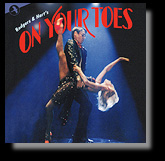 Another Rodgers and Hart reissue, the recording of the 1983 Broadway
revival of On Your Toes remastered by JAY Records, is only marginally less magical than
Syracuse. Since the majority of the show's appeal resided in the
dances rather than the songs, the show transfers less successfully to
disc. While the show contains fewer song gems than the rest of Rodgers and
Hart's oeuvre (the show's one big hit "There's A Small Hotel" and
two minor standards with "It's Got To Be Love" and "Glad To Be Unhappy"),
orchestration-wise, the show is a gem. The dance arrangements, as to be
expected, are lush and full, especially the "La Princesse Zenobia Ballet"
and the classic "Slaughter On Tenth Avenue." Another Rodgers and Hart reissue, the recording of the 1983 Broadway
revival of On Your Toes remastered by JAY Records, is only marginally less magical than
Syracuse. Since the majority of the show's appeal resided in the
dances rather than the songs, the show transfers less successfully to
disc. While the show contains fewer song gems than the rest of Rodgers and
Hart's oeuvre (the show's one big hit "There's A Small Hotel" and
two minor standards with "It's Got To Be Love" and "Glad To Be Unhappy"),
orchestration-wise, the show is a gem. The dance arrangements, as to be
expected, are lush and full, especially the "La Princesse Zenobia Ballet"
and the classic "Slaughter On Tenth Avenue."
The singers are all delightful as well, and impart timeless quality to
the piece. The standout on the disc is Christine Andreas, who brings a
tender poignancy to "Glad To Be Unhappy" and a sense of joy to "It's Got
to Be Love."
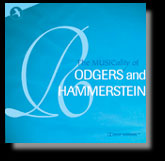 JAY Records has also released the Rodgers and Hammerstein edition of
their Musicality series. As with the previous releases in the series, the album
is a compilation of material by the featured writers from the JAY
catalogue. While the CD contains nothing truly groundbreaking as the song
choices are largely what you would expect, they are expertly delivered and
recorded. Highlights include the little heard "No Other Love Have I" (from
Me and Juliet and delightfully sung by Brent Barrett and Kim
Criswell) and "Everybody's Got A Home But Me" (from Pipe Dream and
evocatively sung by Judy Blazer). Of special note is Pat Suzuki's return
to Rodgers and Hammerstein-land with "Bali Hai." JAY Records has also released the Rodgers and Hammerstein edition of
their Musicality series. As with the previous releases in the series, the album
is a compilation of material by the featured writers from the JAY
catalogue. While the CD contains nothing truly groundbreaking as the song
choices are largely what you would expect, they are expertly delivered and
recorded. Highlights include the little heard "No Other Love Have I" (from
Me and Juliet and delightfully sung by Brent Barrett and Kim
Criswell) and "Everybody's Got A Home But Me" (from Pipe Dream and
evocatively sung by Judy Blazer). Of special note is Pat Suzuki's return
to Rodgers and Hammerstein-land with "Bali Hai."
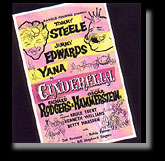 One of the more interesting reissues to surface is the long-awaited
original cast recording of the London stage production of Rodgers and
Hammerstein's Cinderella, produced as a Christmas pantomime in 1958
by British impresario Harold Fielding. The show bares no resemblance to
any other production of Cinderella, on television or on
stage. In typical British Musical Hall tradition, the parts of the
stepsisters were played by men (Kenneth Williams and Ted Durante). Greater
emphasis was also placed on the comic aspects of the script, thanks to the
augmentation of the part of the King (played by renowned comic Jimmy
Edwards) and the creation of Buttons, a servant to Cinderella's father
(played by Tommy Steele, best known for the stage and screen versions of
Half a Sixpence and the film version of Finian's Rainbow).
In fact, the titular character (played by dulcet toned Yana, a television
star of the time) gets third billing and is treated almost as a secondary
character. Based on the cast list, it also appears that the usual
motivator of villainy, the stepmother, is missing in action. One of the more interesting reissues to surface is the long-awaited
original cast recording of the London stage production of Rodgers and
Hammerstein's Cinderella, produced as a Christmas pantomime in 1958
by British impresario Harold Fielding. The show bares no resemblance to
any other production of Cinderella, on television or on
stage. In typical British Musical Hall tradition, the parts of the
stepsisters were played by men (Kenneth Williams and Ted Durante). Greater
emphasis was also placed on the comic aspects of the script, thanks to the
augmentation of the part of the King (played by renowned comic Jimmy
Edwards) and the creation of Buttons, a servant to Cinderella's father
(played by Tommy Steele, best known for the stage and screen versions of
Half a Sixpence and the film version of Finian's Rainbow).
In fact, the titular character (played by dulcet toned Yana, a television
star of the time) gets third billing and is treated almost as a secondary
character. Based on the cast list, it also appears that the usual
motivator of villainy, the stepmother, is missing in action.
Structurally, the show was vastly altered as well. The score has been
augmented with three songs from Rodgers and Hammerstein's Me and
Juliet: "A Very Special Day," "Marriage Type of Love," and "No Other
Love." In addition, a song written by Tommy Steele was added to give him
and Edwards a Music Hall turn. The song order has also been radically
altered, and as the CD fails to provide a plot synopsis, it is sometimes
puzzling as to how the songs fit the changed storyline. "Do I Love You
Because You're Beautiful?," "Stepsisters' Lament" and "When You're Driving
Through The Moonlight/A Lovely Night," for example, all occur before the
ball (and dialogue inclusions make these changes appear to be part of the
show rather than an arbitrary song order for the CD).
More than merely a curiosity, the album is a well-produced and
vocalized treat and well worth adding to one's collection.
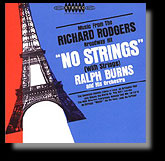 Another intriguing Rodgers inspired album is No Strings (with
Strings) by Ralph Burns and his Orchestra. Burns, who orchestrated
Rodgers' show No Strings (for which Rodgers wrote both the music
and the lyrics), was given strict instructions by Rodgers not to include
any strings in the show's orchestrations. For this album, Burns
rearranged the songs for a full orchestra, with a great deal of the
melody line being given to the newly created string section. Another intriguing Rodgers inspired album is No Strings (with
Strings) by Ralph Burns and his Orchestra. Burns, who orchestrated
Rodgers' show No Strings (for which Rodgers wrote both the music
and the lyrics), was given strict instructions by Rodgers not to include
any strings in the show's orchestrations. For this album, Burns
rearranged the songs for a full orchestra, with a great deal of the
melody line being given to the newly created string section.
The album, from DRG, avoids sounding like easy listening Musak arrangements thanks
to the pizzazz and bounce Burns imparts to the orchestrations. The album
contains an entertaining mix of some of Rodgers' most melodic numbers,
("You Don't Tell Me" and "Nobody Told Me") and some fun swinging big band
songs ("Be My Host" and "The Sweetest Sounds").
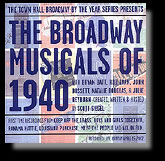 If one is tired of an all-Rodgers album, one can get a healthy (but not
overwhelming) sampling of his music on The Broadway Musicals of 1940, recorded live on March 18 by Bayview, 2002 at Town Hall in New York. Part of
Scott Siegel's series exploring the shows that opened on Broadway in a
given year, The Broadway Musicals of 1940 features songs from two
Rodgers and Hart shows: the hit Pal Joey and not-quite-a-hit
Higher and Higher. From the former, Bryan Batt gets to display his
all-too-infrequently shown sensitive side (one that directors and
producers would be well advised to showcase more often) with a tender "I
Could Write A Book." Natalie Douglas shines on a beautifully introspective
"Bewitched, Bothered and Bewildered," also from Pal Joey. From
Higher and Higher, Rob Evan lends his rich baritone to the
exuberant and romantic/patriotic "Life! Liberty!" and Julie Reyburn gives
a heart-aching rendition of the one standard to come out of the show, "It
Never Entered My Mind." If one is tired of an all-Rodgers album, one can get a healthy (but not
overwhelming) sampling of his music on The Broadway Musicals of 1940, recorded live on March 18 by Bayview, 2002 at Town Hall in New York. Part of
Scott Siegel's series exploring the shows that opened on Broadway in a
given year, The Broadway Musicals of 1940 features songs from two
Rodgers and Hart shows: the hit Pal Joey and not-quite-a-hit
Higher and Higher. From the former, Bryan Batt gets to display his
all-too-infrequently shown sensitive side (one that directors and
producers would be well advised to showcase more often) with a tender "I
Could Write A Book." Natalie Douglas shines on a beautifully introspective
"Bewitched, Bothered and Bewildered," also from Pal Joey. From
Higher and Higher, Rob Evan lends his rich baritone to the
exuberant and romantic/patriotic "Life! Liberty!" and Julie Reyburn gives
a heart-aching rendition of the one standard to come out of the show, "It
Never Entered My Mind."
1940 was an intriguing year in that, although the world's political
attention was focused on increasing tensions in Europe, the musical world
looked toward Latin America for song styles. Thus, we get Julie Reyburn
urging us to "Visit Panama" (from Cole Porter's Panama Hattie), Rob
Evan exploring the sensual "The Latin In Me" (a premier recording from
Sammy Fain/Jack Yellen's Boys and Girls Together), and John Dossett
informing us (via Burton Lane and Yip Harburg's Hold On To Your
Hats), "There's A Great Day Coming Manana").
Overall, The Broadway Musicals of 1940 is the strongest of the
Musicals series thanks to a superb mix of Broadway and cabaret
performers, as well as a delightful mix of known and obscure songs. Other
noteworthy songs are "We Have Sandwiches" (a silly number from
Gorney/Myers' Meet The People, in which Bryan Batt gets to explain
why America is number one), "Ooh! What You Said" (from Carmichael/Mercer's
Walk With Music and sung with great playfulness by Julie Reyburn),
and "It'll Come To You" (from Irving Berlin's Louisiana Purchase
and wonderfully delivered by Reyburn and Douglas).
-- Jonathan Frank
Make sure you check our list of Upcoming Releases.
|
|

